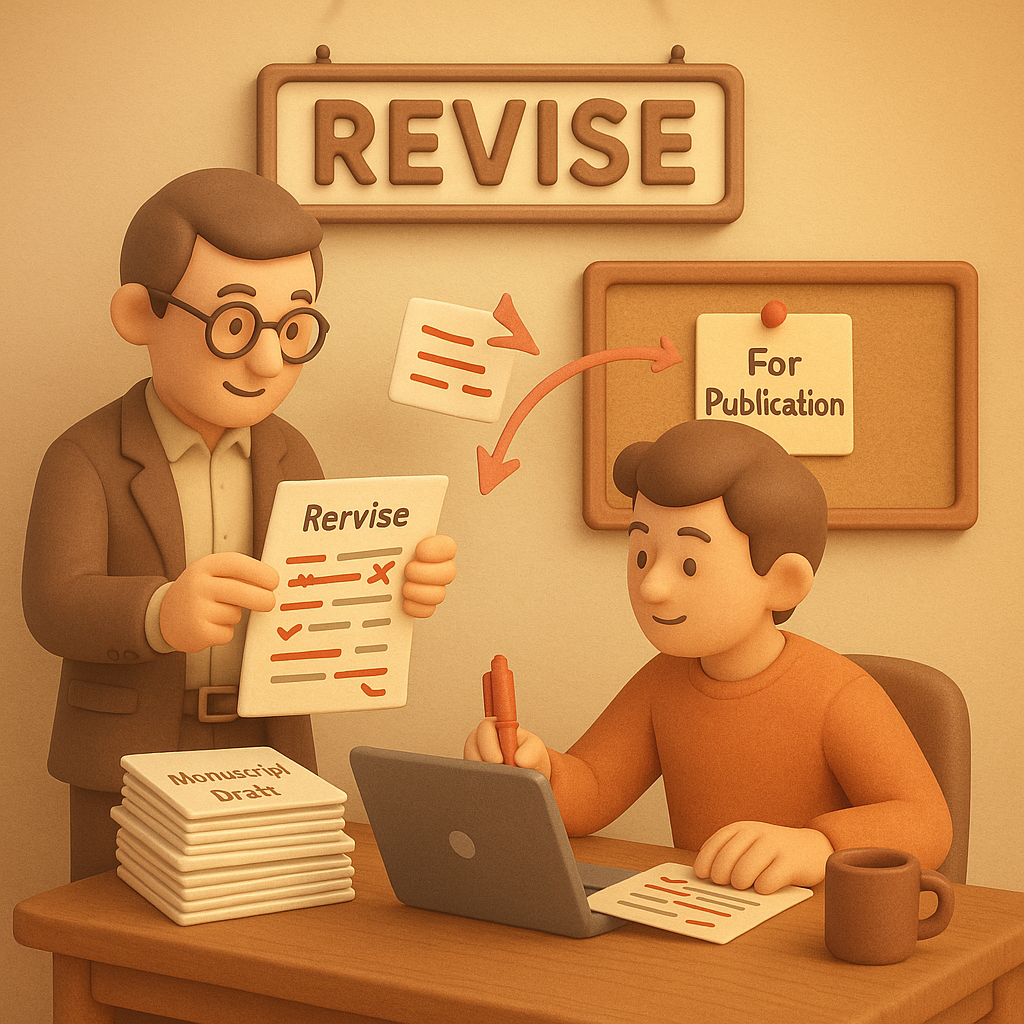Revise
Definition
The term "revise" describes the act of reviewing, altering, or improving something, such as a written document, plan, or idea, to make it better or more accurate.
Parts of Speech
- Verb
- Noun
Pronunciation
American English
- IPA Pronunciation: /rɪˈvaɪz/
- Respelling: ri-VYZ
British English
- IPA Pronunciation: /rɪˈvaɪz/
- Respelling: ri-VYZ
Etymology
The word "revise" originates from the Latin "revidere," meaning "to see again," derived from "re-" (again) and "videre" (to see). It entered English through Old French "reviser," retaining the sense of reviewing or correcting.
Derivatives
- Revision (noun)
- Revisable (adjective)
- Reviser (noun)
- Revised (adjective)
- Unrevised (adjective)
Synonyms
- Edit
- Amend
- Alter
Antonyms
- Ignore
- Neglect
- None
Usage
The term "revise" is used in contexts such as writing, academic preparation, and planning. For example, "The professor asked her to revise the essay for clarity" or "He spent the weekend revising for his exams."
Related Terms
- Correction: The action of rectifying an error or inaccuracy.
- Adjustment: A minor change made to improve or adapt something.
- Amendment: A formal change or addition made to a document or plan.
Detailed Definitions
Verb
- To review and improve a written work or plan: Refers to editing or reworking a draft to enhance its quality.
- Example: "The editor asked the author to revise the manuscript for publication."
- To study material again for better understanding: Commonly used in British English to refer to exam preparation.
- Example: "She spent hours revising for her mathematics exam."
- To alter or modify: Refers to making changes to adapt something to new conditions or needs.
- Example: "The company decided to revise its marketing strategy."
Noun
- A process of reviewing and improving something: Refers to the act of editing or altering a document, plan, or idea.
- Example: "The essay went through several revises before submission."
revise



🇨🇳 Chinese (Mandarin)
- 复习 (fùxí) - review for a test
- IPA: /fù.ɕǐ/
- Respelling: fu-xi
- 修订 (xiūdìng) - make corrections to
- IPA: /ɕjóu.tîŋ/
- Respelling: xyou-ding
🇮🇳 Hindi
- समीक्षा करना (samiksha karna) - review for a test
- IPA: /sə.miːkʃɑː kər.nɑː/
- Respelling: sa-mee-ksha kar-na
- सुधारना (sudharana) - make corrections to
- IPA: /sʊ.d̪ʱɑː.rɳɑː/
- Respelling: su-dhaa-rna
🇪🇸 Spanish
- Repasar - review for a test
- IPA: /re.pa'sar/
- Respelling: re-pa-sar
- Revisar - make corrections to
- IPA: /re.bi'sar/
- Respelling: re-bi-sar
🇫🇷 French
- Réviser - review for a test
- IPA: /ʁe.vi.ze/
- Respelling: re-vi-ze
- Corriger - make corrections to
- IPA: /kɔ.ʁi.ʒe/
- Respelling: ko-ri-je
🇸🇦 Arabic (Modern Standard Arabic)
- المراجعة (almuraja'a) - review for a test
- IPA: /al.muːˈraː.dʒaʕah/
- Respelling: al-mu-ra-ja-ah
- تعديل (ta'dil) - make corrections to
- IPA: /taʕ.diːl/
- Respelling: ta-dil
🇧🇩 Bengali
- পর্যালোচনা করা (paryalochana kara) - review for a test
- IPA: /pɔrjalocona kɔra/
- Respelling: parya-locho-na ko-ra
- সংশোধন করা (sanśodhana kara) - make corrections to
- IPA: /ʃɔŋʃod̪ʱona kɔra/
- Respelling: shong-shodhona ko-ra
🇷🇺 Russian
- Пересматривать (Peresmatrivat') - review for a test
- IPA: /pʲɪrʲɪsmɐˈtrʲivətʲ/
- Respelling: pe-re-smat-ri-vat
- Исправлять (Ispravlyat') - make corrections to
- IPA: /ɪsprɐˈvlʲætʲ/
- Respelling: is-prav-lyat
🇵🇹 Portuguese
- Revisar - review for a test
- IPA: /ʁɨ.vi'zaɾ/
- Respelling: re-vi-zar
- Corrigir - make corrections to
- IPA: /ko.ʁi'ʒiɾ/
- Respelling: ko-ri-zhir
🇮🇩 Indonesian
- Merevisi - review for a test
- IPA: /mərɛvisi/
- Respelling: me-re-vi-si
- Mengoreksi - make corrections to
- IPA: /məŋoʁɛksi/
- Respelling: men-go-rek-si
🇩🇪 German
- Überarbeiten - review for a test
- IPA: /ˌyːbɐaʁˈbaɪ̯tn̩/
- Respelling: ue-ber-ar-bei-ten
- Korrigieren - make corrections to
- IPA: /kɔˈʁiːɡiːʁən/
- Respelling: ko-ri-gie-ren
🇯🇵 Japanese
- 復習する (fukushū suru) - review for a test
- IPA: /ɸɯ̟ᵝkɯ̟ᵝɕɯ̟ᵝ sɯ̟ᵝɾɯ̟ᵝ/
- Respelling: fu-ku-shu su-ru
- 修正する (shūsei suru) - make corrections to
- IPA: /ɕɯ̟ᵝːse̞i sɯ̟ᵝɾɯ̟ᵝ/
- Respelling: shu-sei su-ru
🇻🇳 Vietnamese
- Ôn tập lại - review for a test
- IPA: /ʔəːn təp laj/
- Respelling: on tap lai
- Chỉnh sửa - make corrections to
- IPA: /cɨn sʷa/
- Respelling: chin swa
🇰🇷 Korean
- 복습하다 (boksaphada) - review for a test
- IPA: /bok̚s͈ʰapʰada/
- Respelling: bok-sa-pa-da
- 수정하다 (suseonghada) - make corrections to
- IPA: /sʰusʰʌŋhada/
- Respelling: su-seong-ha-da
🇹🇷 Turkish
- Gözden geçirmek - review for a test
- IPA: /gœzden ɟet͡ʃiɾmek/
- Respelling: goz-den get-chir-mek
- Düzeltmek - make corrections to
- IPA: /dyˈzeltmek/
- Respelling: du-zelt-mek
🇵🇰 Urdu
- جائزہ لینا (jaiza lena) - review for a test
- IPA: /d͡ʒɑː.iz̪.ɑː le.nɑː/
- Respelling: ja-i-za le-na
- درست کرنا (durst karna) - make corrections to
- IPA: /d̪ʊɾst̪ kəɾ.nɑː/
- Respelling: durst kar-na





